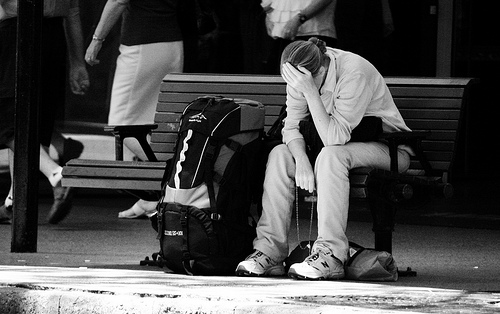
Why is a 10 year old drinking a Venti Frappucino? Why is everybody so loud? Were Americans always so tall? But seriously, the drinks are so big! I’ll never forget stepping into Seattle airport, my first taste of America in six months after studying abroad in Tokyo. Everything seemed overwhelming. I had become accustomed to the soft hum of Japanese, which I had learned to subsequently tune out since I couldn’t understand most of it. In Japan, hearing English would immediately grab the attention of my ears. Because of that, I was overhearing everyone’s conversations, mostly against my will. I was used to spending a lot of time speaking with gestures and simple phrases. When I had the opportunity to use my extended vernacular, I took advantage of it by attempting to engage in a riveting philosophical discussion with a hat shop employee. I think I freaked him out as he told me that I didn’t quite have the right look for hats. (What?) I had become socially inept.
Dealing with reverse culture shock by integrating back into American society was more difficult than my transition into the Japanese lifestyle. I left open-minded, eager to give everything a try. I returned home with my mind expanded. I tried to go back to my old routine, but I couldn’t. I was a different person.
I went from a sprawling metropolis crammed with 35 million people to Boise, Idaho, whose population just exceeded 200,000. Everything seemed so flat, as the tallest building in town was a modestly sized bank. I couldn’t understand throwing things in the trash. Separating items into combustibles, non-combustibles, PET bottles, regular bottles, cans, and magazines just seemed more sensible. I was outraged that at age 20 I was going to izakayas (Japanese drinking establishments) with my professors and now I was not allowed to go to the bars. I kept vocalizing complaints about America and praises about Japan, much to the chagrin of my boyfriend and friends. In fact, I soon learned that after a few sentences, everybody started tuning me out.
It was frustrating. I didn’t expect to feel like an outsider in my home country. In ways, it was more jarring than the initial culture shock because I wasn’t prepared for it. I thought it’d be easy. But everything felt… foreign.
In Japan, my friends and I had discussed what we’d eat when we first got back. Steak was the overwhelming consensus. When I tried to engorge said steak, I felt immediately sick. My body was used to ramen, rice, curry, and sushi, not large slabs of meat. I couldn’t keep up with conversations about pop culture. I wasn’t used to cooking food for myself anymore. Why were buildings spaced so far apart? The school curriculum in America seemed inefficient. Why did nobody carry umbrellas when it was raining? It was alienating. I just didn’t get it.
Like the initial leap to Japan, I needed some time to adjust. I started catching up with friends and visiting old haunts. I got my old job back and started a new school semester. I kept busy. I even got a second job at a hostel, allowing me to exchange stories with travelers. I stopped constantly comparing everything with Japan and over the next month, successfully integrated back into American society.
(Except I stopped ordered oversized coffee drinks and upsized French fries. Some things are just for the better.)